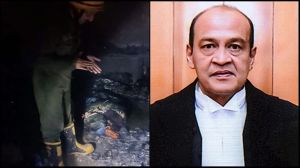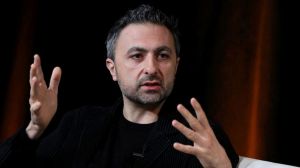Love, Unhurried
When Michael Ondaatje steps forward into the future, he is actually revealing the past

Divisadero
Michael Ondaatje, Bloomsbury, 17.99 pounds
No one writes quite like Michael Ondaatje. Referred to as a poetic novelist, his writing is set apart by the sensuality he imbues his prose and characters with. Divisadero, his latest offering, is his most intimate work. Even more than The English Patient. And demands a second and third read to fully submerge your self in the intricate delights the novel offers.
Described as having a rare gift of language and observation by Pico Iyer, Ondaatje uses this ability to lead you from San Francisco to Nevada to south-central France.
You hopscotch from the time of Anna, Claire and Coop as teens to their separation as adults, finally transcending time to encounter Lucien Segura at the turn of the century. Guiding you through this complex journey is the author and his craft, ensuring you never miss a step or a heartbreaking moment. Because like Gabriel Garcia Marquez, the 64-year-old Canadian who was born in Ceylon is a master at turning time on its head with his measured literary pace. Because Ondaatje knows that in the heart of life lies but one truth: love. And love cannot be hurried. Its dance must be conducted as a languorous waltz, picking up pace as the music reaches a crescendo. Until love turns itself into violence and rage.
And drives a family apart. When Anna8217;s father discovers her with Coop, an orphan who works on their farm, the family disintegrates. Years later, Anna finds herself in rural France where she immerses herself in the life of Segura, a writer who used to reside there. Coop, a card sharp in Nevada, is flirting with danger and runs into Claire just when his lifestyle nearly destroys him.
The narrative shifts from the past to the present, juxtaposing their lives through links in their histories.
Divisadero could have been a difficult book to read given that there is no real logic underlying the telling of the tale. It jumps through time and space, forcing you to abandon all convention. And yet, it isn8217;t a complicated read because emotion doesn8217;t need reason to exist. So when Ondaatje steps forward into the future he is actually revealing the past. The answer to this unusual yet lyrical treatment lies in the title of the book itself.
The word 8220;divisadero8221; comes from the Spanish word for division. The word divisar also means to gaze at something from a distance. Named after a street where Anna once lived and mentions only in passing, she explains, 8220;It is what I do with my work, I suppose. I look into the distance for those I have lost, so that I see them everywhere.8221;
Reading Michael Ondaatje is like watching a film. The imagery is so vivid that you can see it in your mind8217;s eye.
Treat yourself to this art-house novel. It is perhaps his best work so far.
- 01
- 02
- 03
- 04
- 05































